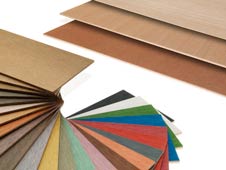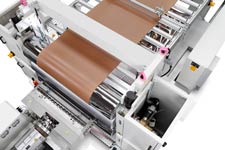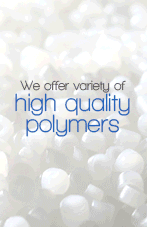
At a recent open house, KraussMaffei Berstorff presented its concept for producing Resysta weatherproof sheets based on renewable raw materials at the TechCenter, which is equipped with a twin-screw extruder in the 32D series. The sheets are primarily targeted for outdoor applications such as facades.
According to Andreas Kessler, General Sales Manager at KraussMaffei Berstorff in Munich, the sheet production line - equipped with the KMD 90-32/WPC twin-screw extruder and a vertical three-roll polishing stack as the key components - produced 4-mm-thick, 1,000-mm-wide Resysta sheets with an output of 300 kg/hour. During a series of talks focusing primarily on this topic, customers were also able to obtain more detailed information on the material composition, the production requirements and the end product. Kessler is anticipating a promising future, "Since we are now also seeing greater use of renewable raw materials in sheet extrusion due to growing worldwide demands for sustainable production, we will be able to serve a new market segment with this product in the long term."
Processing of natural fibre-reinforced plastics calls for a high degree of process engineering know-how and active wear resistance of the processing unit. “The material mixture supplied by our cooperation partner Resysta is a specially developed fibre-reinforced hybrid material made of ground treated rice husks with an added PVC carrier material," said Peter Oswald, Head of Product Management at KraussMaffei Berstorff. “We systematically geared our machine concept to these requirements: for example, a specific metering device ensures a constant material feed. Since the adapted special venting zone in our 32D twin-screw extruders ensures that the residual moisture can properly escape, the moisture content during the production process remains constantly below 0.6%," added Oswald. A high installed screw torque, coupled with internal screw heat balancing and screw geometry specially modified for the Resysta compound, provides a homogeneous melt.

"Another 'must' for Resysta processing machines is active wear resistance," said Oswald. "Screws must have wear proof protection well beyond the normal level of wear resistance while the barrels must also be lined to a correspondingly high degree. This combination ensures maximum protection of the processing unit against corrosive and adhesive wear during processing of the Resysta compound.”
KraussMaffei Berstorff recently started cooperating with Resysta International, a company based in Taufkirchen near Munich that distributes its patented compound Resysta ARF (Active Resysta Filler) globally. Extracted from rice husks - an agricultural raw material which has barely been used to date - the material is resistant, has a ecological balance sheet and therefore sets new standards in sustainable production. It is also said to ensure mechanical and weatherproof property patterns. The end product is UV-resistant, does not rot, and does not form any cracks or splinters; it is colourfast and can be recycled. It therefore requires little maintenance and looks just like real wood both optically and haptically. It is therefore mainly used whenever both weather resistance and a wood look are required, for example outdoor furniture, floor coverings in a wet cell or outside, ships' decks or house facades.
(PRA)

















